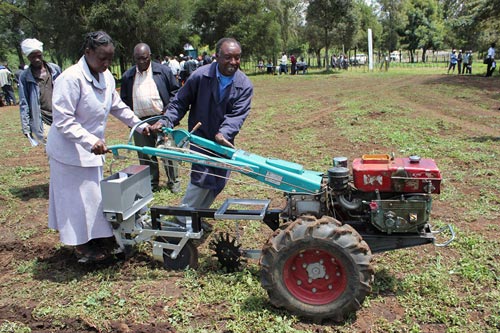By Frédéric Baudron/CIMMYT

A lightweight seeder designed for conservation agriculture could help households headed by women in eastern and southern Africa to adopt the technology. CIMMYT’s Farm Mechanization and Conservation Agriculture for Sustainable Intensification (FACASI) project is addressing declining farm power by delivering small mechanization to farmers. Femalerun households are particularly labor-constrained. They often don’t own or are not permitted to use draft animals and are among the last to access land preparation services, which severely affects yield.
FACASI imported several female-friendly seeders designed by John Morrison, a consultant and adjunct professor at the University of Tennessee. Unlike other commercially available machines, which are bulky, heavy and challenging for women to use, Morrison’s development is a light, singlerow seeder specially designed for operation in non-plowed fields. The seeder is equipped with a residue rake to clear crop residue from the path, a rolling coulter blade to cut any remaining residues in the path, a furrow-opener shank to open a soil slot for seeds and fertilizer and a pressing wheel to help the operator press the soil slot closed.
The seeder performed well during its pre-test last month in Njoro, Kenya, by women, FACASI scientists and John Morisson himself, and later at a demonstration to the CIMMYT Board of Trustees. Thorough field testing will take place next November in Kenya and Tanzania. A business model will also be developed to guarantee access to the technology for women farmers. The proportion of women-headed households is particularly high in eastern and southern Africa (23 percent in Ethiopia, 32 percent in Kenya and 38 percent in Zimbabwe), according to the World Bank. Increasing the power available to these households – through small mechanization and promoting power-saving technology such as conservation agriculture – is one way to close the gender gap.
 Innovations
Innovations 
